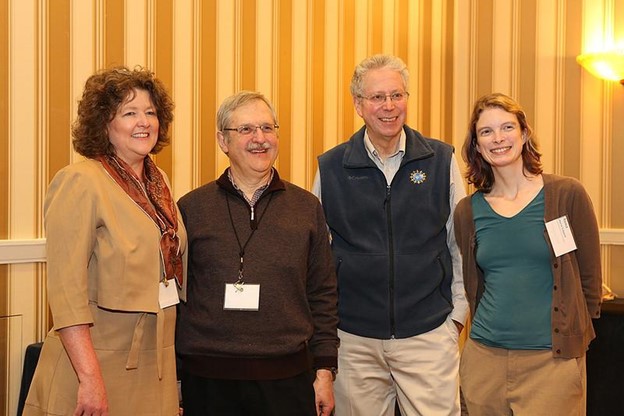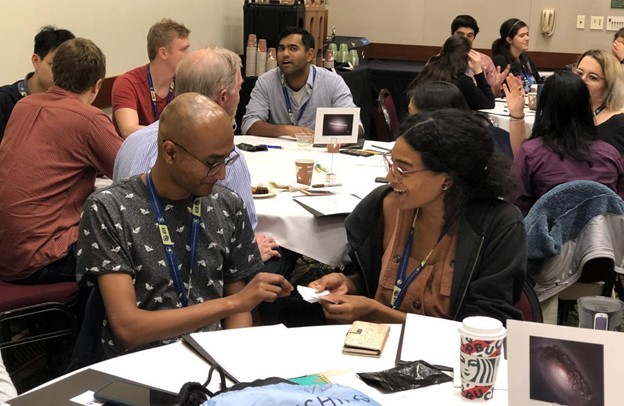The AAS Ambassadors Program: Training Early-Career Astronomers for Effective Outreach
Andrew Fraknoi Fromm Inst./U of San Francisco

Did you know that the American Astronomical Society (AAS) has an active program to train early-career astronomers on how to do effective outreach? The AAS Ambassadors program began in 2013 as a legacy of the presidency of Debra Elmegreen. She was worried that young people in astronomy did not come out of graduate school with sufficient grounding on how to explain their work to the public. So, she gathered a group of us who were active in astronomy outreach to see what the Society could do to help.
From that discussion there eventually emerged a new AAS program to train early-career astronomers in how to convey their research to those outside of science. One additional reason to encourage outreach by younger astronomers was that they tended to represent the increasing diversity of our field, and could be excellent role models to help young people envision themselves as scientists.
The AAS soon engaged the Astronomical Society of the Pacific (ASP) to develop and deliver training workshops for the program on the weekend preceding each AAS winter meeting. The AAS created project web pages and a roster with a US map to show where the Ambassadors are active. The ASP had the infrastructure to develop an online community for the Ambassadors, which includes a website through which they can communicate with each other about the project, a Facebook page, and a series of follow-up webinars.
The heart of the Ambassadors Program is the intensive, two-day, hands-on workshop that all participants attend. We generally have about 35 early-career astronomers (ranging from graduate students to new faculty) enrolled, for about eight hours of discussion and activities each day. They become acquainted with techniques for good outreach, including using appropriate vocabulary, understanding difficulties audiences may have with scientific processes and information, the dangers of bad PowerPoint slides, and knowing how to assess the success of their presentations.
They also learn about existing materials that can help astronomers doing outreach, including a wide range of programs already in place at astronomical institutions, hands-on activities for various age groups, and helpful material from another project, Portal to the Public, which trains scientists in many fields to be outreach agents in science museums.
At the end of the workshop, each participant is asked to give a brief talk, explaining their own research in everyday language to a small subset of the attendees. Everyone in the group, including an assigned workshop leader, then gives gentle feedback on what worked and what could have been improved.
The “graduates” of each workshop become connected with one another and the previous Ambassadors cohorts through an online platform at the ASP. They are asked to do a certain number of outreach programs for the next year or two and then make a record of it in the program’s database. If they run into an outreach issue or need a specific resource, they can ask the staff and all the Ambassadors for help.
Furthermore, to help the Ambassadors navigate the large variety of web resources on astronomy outreach, we prepared an online guide, entitled Menu of Outreach Opportunities for Science Education. It includes sections on how and where to be an astronomy Ambassador, and what things you might undertake as outreach projects.

As of the end of 2020, about 250 astronomers have been trained in the program. In 2019, we did a survey of the existing Ambassadors. Here are a few of the sample answers:
- Prior to the workshop, 82% of the participants reported little or no confidence in their awareness of outreach resources. After the workshop, 100% of the participants reported being confident in their awareness of outreach resources!
- Ninety percent of the participants reported a positive change in their confidence and ability to communicate their research as compared to before the workshop. When asked “How useful was the Ambassadors workshop in your outreach work?” on a 1-5 scale, 77% answered with a 4 or 5. When asked “How useful was the training on communication skills?”, 82% rated it 4 or 5.
Among the comments in the survey were these:
- “The AAS Ambassador program completely changed how we as a department did outreach. We implemented many of the activities that we learned at the workshop into our routine outreach activities and they are now staples of what we do.”
- “I think the program has led me to bring more nuance to my science communication with non-experts. I am more likely to check my own assumptions about what people know or should understand, and consider instead how I should adjust my own words/tone/actions to get my point across.”
- “I got a faculty position, which makes heavy use of my active learning skills…My extensive experience with education and public outreach got me the interview.”
The ASP has received a grant from the National Science Foundation to develop “On-the-Spot Feedback” techniques for the Ambassadors and other scientists doing outreach. The idea is to teach participants ways of assessing how their outreach programs are going while they are still happening and then adjust their approach to take the audience’s reception into account. A manual for these techniques and workshop sessions to convey them are being developed and tested.
Overall, the program appears to be effective in providing astronomers with techniques and materials for interacting with the public early in their careers. A number of the Ambassadors reported that being a member of the program has been an advantage in their search for positions in the field. Our hope is that the program will help produce a generation of professional astronomers in the US who value the importance of communicating our results to the public and can thus help our profession better demonstrate its value to society.
COVID willing, our next Ambassadors workshop will be before the 2022 AAS winter meeting in Salt Lake City, Utah.

